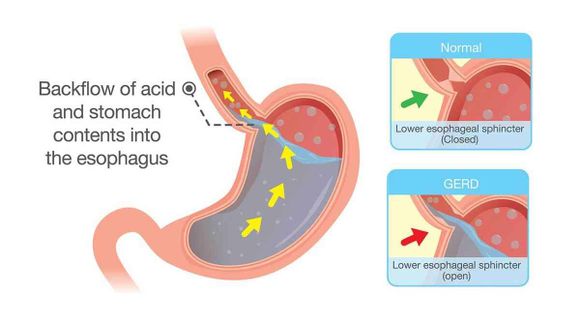1. Persistent Heartburn - A Prominent Indicator
Persistent heartburn is a hallmark symptom of GERD, characterized by a burning sensation in the chest or throat. This discomfort worsens when lying down or bending over, and it requires immediate attention. A soothing herbal remedy like Chamomile (Matricaria chamomilla) can offer relief. With its anti-inflammatory and calming properties, chamomile tea can be prepared by steeping 2 teaspoons of dried chamomile flowers in a cup of hot water for 5-10 minutes. Sip this tea 2-3 times daily to ease symptoms.
2. Regurgitation - A Sour Taste of GERD
GERD often leads to regurgitation, where stomach acid and undigested food flow back into the mouth, causing a sour or bitter taste. This condition can also result in bad breath and a foul taste. Incorporating Ginger (Zingiber officinale) into your diet may help manage regurgitation. Renowned for aiding digestion and reducing stomach discomfort, prepare a ginger infusion by adding 1-2 teaspoons of freshly grated ginger root to a cup of hot water. After steeping for 10 minutes, strain the infusion and enjoy this soothing drink.
3. Chronic Cough and Sore Throat - GERD's Lingering Effects
Chronic cough and sore throat are common outcomes of GERD's irritation in the esophagus and throat. The acid reaching the throat triggers irritation, causing persistent coughing and discomfort. For relief, consider using Slippery Elm (Ulmus rubra). Its mucilage content forms a protective layer over the throat and esophagus, soothing irritation and reducing coughing. Prepare Slippery Elm throat lozenges by mixing 1 tablespoon of powdered Slippery Elm bark with honey and shape them into small lozenges. Consume as needed for relief.

Photo by pisauikan on Unsplash
4. Difficulty Swallowing - A Serious GERD Concern
GERD can lead to difficulty swallowing or a feeling of a lump in the throat, known as dysphagia. This occurs due to inflammation and narrowing of the esophagus. For relief, consider using Aloe Vera (Aloe barbadensis miller). Aloe Vera juice soothes the esophagus and promotes healing. Consume 1/4 cup of Aloe Vera juice 20-30 minutes before meals to ease swallowing difficulties.
Questions and Answers
Q: Can GERD lead to more severe complications if left untreated?
A: Yes, untreated GERD can lead to complications such as esophagitis, Barrett's esophagus, and an increased risk of esophageal cancer.
Q: Are there any lifestyle changes that can help manage GERD symptoms?
A: Yes, lifestyle changes such as avoiding trigger foods, maintaining a healthy weight, eating smaller meals, and not lying down immediately after eating can be beneficial in managing GERD.
Q: Can stress and anxiety worsen GERD symptoms?
A: Yes, stress and anxiety can exacerbate GERD symptoms by increasing stomach acid production and affecting the function of the lower esophageal sphincter.
Q: Are there any specific foods known to alleviate GERD symptoms?
A: Foods like oatmeal, bananas, melons, and vegetables are considered beneficial for managing GERD due to their low acidity and soothing properties.
Q: Are there any natural remedies suitable for pregnant women with GERD?
A: Pregnant women should consult their healthcare provider before using any herbal remedies. However, ginger tea may be considered safe for some pregnant women to alleviate mild GERD symptoms.
References
- "Chamomile: A herbal medicine of the past with a bright future." Molecular Medicine Reports, US National Library of Medicine National Institutes of Health, 2010.
- "Effect of ginger (Zingiber officinale) on reflux and dyspepsia: A systematic review and meta-analysis." Iranian Journal of Pharmaceutical Research, US National Library of Medicine National Institutes of Health, 2017.
- "Slippery elm (Ulmus rubra) bark powder: A review of its efficacy as an adjuvant in oropharyngeal dysphagia." Topics in Geriatric Rehabilitation, US National Library of Medicine National Institutes of Health, 2020.
- "Pharmacological activities of Aloe Vera." Journal of Pharmacy and Bioallied Sciences, US National Library of Medicine National Institutes of Health, 2019.
- "Gastroesophageal Reflux Disease (GERD)." Johns Hopkins Medicine.
- "Lifestyle changes to treat GERD." Michigan Medicine, University of Michigan.
- "Stress and the Gastrointestinal Tract." Visceral Medicine, US National Library of Medicine National Institutes of Health, 2016.
- "Acid Reflux Diet." Healthline.
- "Herbal medicine in pregnancy and childbirth." Advances in Experimental Medicine and Biology, US National Library of Medicine National Institutes of Health, 2016.









